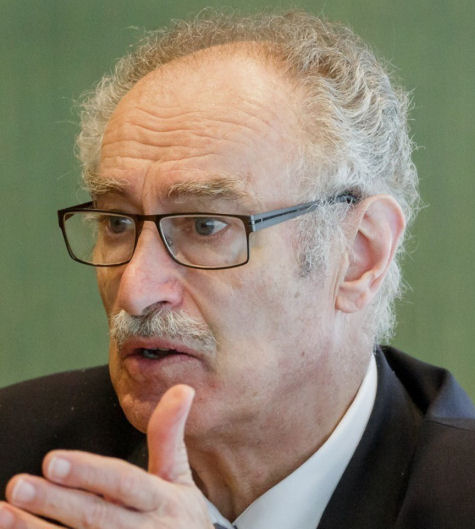
Dr. Bruno Bruehwiler
As reported here earlier, thanks to a tiny handful of delegates led by Switzerland’s Bruno Bruehwiler, and worsened by the absent leadership of Chair Kevin Knight, the ISO technical committee on risk management is facing complete implosion. The entire debacle is an overt lesson on the dangers of allowing consultants to dominate the standards development process, since they care little about their duty to the public, and only about lining their own pockets. There’s a subplot here, too, exposing the nearly comedic way that ISO’s risk management “experts” fail to consider any risks at all when developing standards such as ISO 31000.
Risky Management
TC 262 is responsible for development of the ISO 31000 standard, among other things related to risk management, and is currently working on a scheduled revision to that standard. But the group is infected by a small cadre of conflicted delegates, mostly representing consulting firms and registrars, who are attempting to convert ISO 31000 into a standard designed for management system certification, a la ISO 9001.
The first signs of trouble came a few years back when BSI’s Mick Maghar, secretary of TC 262, published a controversial interpretation of an ancient ISO rule wherein he proposed ISO 31000 have language struck that suggested it was not intended to be used for certification. Shortly thereafter, BSI issued a dubious ISO 31000 certificate to Tata Motors. When I pushed on TC 262 to address the controversy, ANSI’s Steve Cornish finally responded that Maghar was incorrect and would be publishing a corrected statement. I checked back recently, and the statement was never published, and Cornish explained away the inaction:
I understood some time ago that [BSI] may do something. They further considered the situation and chose not to issue a correction. This was an internal committee document issued in 2012 and BSI concluded that it would not add value and could instead cause confusion to re-issue a correction three years later.
What’s troubling in the Cornish comment is that the entire matter was left up to BSI, not TC 262, even though Maghar had published the memo as an official TC 262 document, and not a BSI document. This gives the appearance that Maghar is executing his role as TC Secretary on behalf of BSI, not as an objective, independent Secretary. In any other organization this kind of thing would be a smoking gun, since TC’s are not supposed to be beholden to any single commercial organization (such as BSI), but this is daily practice at ISO, so it’s met with one big shrug. Shameful.
Bruno Bruised
Fast forward to 2015, and Switzerland’s Bruehwiler began telegraphing that the current path for revision of ISO 31000 was not sufficient, and began to indicate that an alternative to the current Design Specification (DS) would be proposed. Bruehwiler failed to mention that it was being proposed by his own Swiss standards body, and that he had a hand in writing it. Bruehwiler’s bizarro-standard would have also paved the way for certification, something his own consulting firm Eurorisk would have benefited from. A flurry of emails were exchanged, with those of Bruehwiler and his top supporter Rodolphe Civet (from France’s AFNOR) characterized as defamatory. The result was Bruno’s camp demanding their non-consensus alternative draft be treated on equal footing as the formally-developed ISO 31000 rewrite, causing a split in the TC 262.
Bruehwiler insisted that the two competing drafts would be debated during an upcoming Working Group 2 (WG2) meeting in Rio de Janeiro, for which he is Chairman, refusing to acknowledge ISO rules which say a Working Group can’t debate such things on its own, and that only the TC as a whole can do so. Bruehwiler ignored all attempts to get him to concede to the ISO rules and was accused of failing to announce his personal conflict of interest in the whole debacle. (Bruehwiler has declined all requests for comments on the matter to date.)
Now, based on a push from the US, Australia, New Zealand, Turkey, Denmark and Ireland, the entire Working Group is being considered for dismantling. The official ballot is for voting as to whether WG2 should be “disbanded” and replaced by an “Ad Hoc Group” under different leadership, effectively kicking Bruehwiler and his cronies to the curb. The proposal accuses Bruehwiler and his WG2 of having “abandoned its initial task of producing a limited revision” and that the “work of WG2 is now in a state of turmoil arising in particular from serious issues of governance.”
Tangen Tangential

Stefan Tangen
What’s interesting is that this has put Maghar in the problematic position of having to (gasp!) do his job as TC Secretary, and move away from simply representing BSI’s commercial interests. Stuck in this position, Maghar has lost support from both camps, with Sweden’s Stefan Tangen commenting to me that much of the Bruno problem was the fault of Maghar’s incompetence, while simultaneously claiming he (Tangen) is in the control of the situation:
No, the simple explanation is that the Swiss didn’t fully understand the ISO system… and the Swiss and Mick didn’t understand each other so they simple set up the wrong process. I told the Swiss 3 months ago that their approach was wrong and I also told Mick. But when people refuse to listen, things get wrong. Eventually they started to listen to me and now things are back on track.
Tangen apparently hasn’t noticed that (a) nobody is listening to him, probably because he’s a minor functionary who has never had a job outside of standards development, and so no one knows who the hell he is, and (b) the entire thing is unraveling before his eyes, and clearly not “back on track” so his advice was as effective as an umbrella on the Titanic.
(Pay attention to the name Tangen, because it appears he is also claiming to be one of the architects of the reviled Annex SL, and will be featured prominently in some upcoming articles on the origin of that mandate. Tangen isn’t smart enough to know he should be running away from any ties to Annex SL, and is instead boasting about powers he doesn’t even have. One half expects Tangen to next take credit for single-handedly building the pyramids of Giza with nothing more than a toothbrush and some cajun spice powder.)

Kevin Knight (visual approximation)
Knight Errant
As usual, TC 262 Chairman Kevin Knight is utterly AWOL, having intentionally and openly abdicated his role in managing the group for which he is supposedly the leader. Knight, along with Bruehwiler, appear to be positioning themselves to bolt from TC 262 and recreate their careers over at the new ISO Technical Committee on “business resiliency”, TC 292. Of course it is all just rearranging furniture, since TC 292 was formerly TC 223 for which Stefan Tangen was a member, and for which his Swedish standards body is the Secretariat.
Telegraphing a “plan B” to move their careers from risk management to resilience management (whatever the hell that means), Knight recently gave a presentation on ISO 31000 to a “resiliency” conference in Abu Dhabi in which Knight suddenly claimed overnight mastery of TC 292’s standard on business continuity, while Bruehwiler’s titled his competing ISO 31000 re-boot “The management of risk – reducing uncertainty and enhancing resilience.”
Leadership Optional
What all of this means is that the ISO TCs are filled to the cakehole with careerist standards developers interested only in their personal gains, with absolute disregard for ISO rules or conflicts of interest. The entire world is their sandbox, and if they can’t publish a standard that helps fill their personal bank accounts in one committee, they will work to disrupt the Committee, or just join a new one. ISO’s Technical Management Board, flush with its authority after mandating the ridiculous Annex SL, appears suddenly inept in corralling these pirates and allows this corruption to fester without restraint.
ISO, meanwhile, is without a Secretary-General, since former SG Rob Steele stepped down in July. The role has been filled by a temporary Acting SG, Kevin McKinley of Standards Council of Canada, but it’s not clear what he could do about this mess since he’s just holding the seat until a permanent SG is found. Still, no Secretary-General is better than having Steele in that office.
At some point ISO will probably take some minimal action. The TC 262 coup is delaying publication of a new ISO 31000 standard, and that costs ISO a lot of money. ISO only makes money when standards are released, and not when they are in development, so perhaps the accountants will finally take some action to shut down the Bruehwiler camp and their disruptive influence.
Christopher Paris is the founder and VP Operations of Oxebridge. He has over 35 years’ experience implementing ISO 9001 and AS9100 systems, and helps establish certification and accreditation bodies with the ISO 17000 series. He is a vocal advocate for the development and use of standards from the point of view of actual users. He is the writer and artist of THE AUDITOR comic strip, and is currently writing the DR. CUBA pulp novel series. Visit www.drcuba.world








